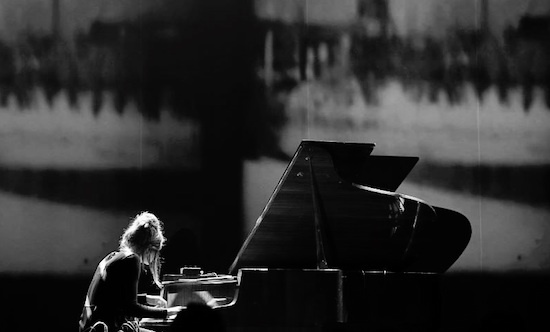Returning for a fourth year, on the 88th day of 2018 (number of keys etc), Piano Day is a global celebration of the piano via artists who find novel ways to approach the instrument. As founder Nils Frahm say, “It doesn’t hurt to celebrate the piano and everything around it: performers, composers, piano builders, tuners, movers and the listener”, but the London event confirmed one towering fact: the future of Piano Day will rest on highlighting evolution rather than pandering to tradition.
(The) space is the place
Wigmore Hall, the Royal Academy of Music, Cadogan Hall: various venues in London could have easily played host to this year’s Piano Day. But none would have ticked the boxes as comfortably as Milton Court Concert Hall, the Barbican satellite venue just down the road from the main building. Designed with both classical and contemporary performance in mind, the 608-capacity space, with supreme acoustics courtesy of sonic doyens Arup Associates, is equal parts scopic and intimate. Artists whose sets are largely built on gossamer-like nuance and clarity – Florian Christl, Marina Baranova and Poppy Ackroyd – flourish in this setting.
Marina Baranova steals the show
Marina Baranova luminous performance leaps from effortless virtuosity to elegiac restraint. While German composer Florian Christl proved a major-keyed music publisher’s dream (the highest compliment that could be paid to a composer of his ilk) and headliner Poppy Ackroyd’s neo-classical experimentalism wowed the home crowd, Baranova’s set was revelatory, and a perfect case-in-point for the forward-moving nature of Piano Day. Performing from her new album, Unfolding Debussy, her jazz-leaning set filtered the life and relationships of the French composer via tableaux of prepared piano, vocals and some auspicious atonality and improvisational flourishes. At one point blurring the lines between the ivoried post-rock impressionism of Gastr Del Sol via insistent Chicago house, the Hanover-based artist emerged as a voice that contemporary piano needs.
Unconventionality is the future of piano
The physicality of Florian Christl’s playing; Marina Baranova using the piano rhythmically by way of carefully timed bangs; Poppy Ackroyd’s slew of tightly rehearsed extended techniques: the most inspired moments at Piano Day stem from pushing against the boundaries of what a piano can do, and showing how vital accompaniment and manipulation are. Ackroyd’s set-up of piano, violin, vocals, tape loops and visuals form a coalescence of sound and vision drawing from her new album, Resolve, and prove that unconventionality is key.
Piano Day is for everyone – really
It’s a truth universally acknowledged that midweek solo piano recitals can sometimes fall on the wrong side of stifling. Founded back in 2015 as a way to unite piano lovers of all ages and dispositions, Piano Day has struck a midpoint between accessibility and a certain savoir vivre. At Milton Court, this manifests itself in a room split right down the middle in terms of clientele that saw (at least) one attendee in a well-worn Motörhead hoodie rub shoulders with Chardonnay-sipping dyed-in-the-wool classicists. Piano Day reinforced the sometimes-neglected notion that — especially at an event promoting big strides in the genre — classical music should never be seen as sophisticated music for sophisticated people.
Nils Frahm has the right idea
With 42 separate cities hosting over 70 performers and artists, Piano Day is much more than one or two ad hoc events. At the root of this far-flung vision is Hamburg’s Nils Frahm, who knows that perceptual change requires progressive shifts to lessen generational and geographic divides. Though it obviously isn’t at any risk of going kaput any time soon, one couldn’t help but leave Milton Court feeling that the future of the piano as a contemporary instrument is in safe hands as long as Piano Day sticks to its wholesome agenda of putting the everyday listener centrestage.


